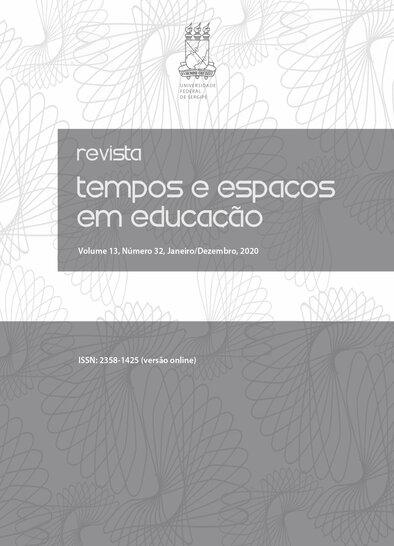Training of future teachers for work with children under the conditions of preschool inclusive education
DOI:
https://doi.org/10.20952/revtee.v13i32.14943Palavras-chave:
Preschool educational institutions; inclusiveness; inclusive education; educators; teachers.Resumo
The objective of this study is to identify areas of training of teachers, as well as a set of skills needed to work in inclusive institutions, taking into account the criteria of readiness of teachers. The study involved generalization, abstraction, grouping, and survey methods. Grouping the components of readiness of future teachers for preschool inclusive education allowed to identify several basic components: motivational, cognitive, value-content and operational-activity. Also was identified conceptual criteria for the readiness of future teachers, to assess the importance of each of them through a survey. The results of the study have several limitations, in particular insufficiently covered practical component of training of preschool teachers, as well as the limited number of research methods used in this article.
Downloads
Referências
Dias P. C. (2015) Effects of personal and professional factors on teachers’ attitudes towards inclusion in preschool, European journal of special needs education, 31 (1) https://www.tandfonline.com/doi/abs/10.1080/08856257.2015.1108040
Dashti, E. (2020). Examining the relationship between unwillingness to translate and personality type of Iranian translation students. Journal of Research and Knowledge Spreading, 2020, 1(1), 1-10. https://doi.org/10.20952/jrks1111467
Florian L. (2015) Conceptualising Inclusive Pedagogy: The Inclusive Pedagogical Approach in Action, Inclusive Pedagogy Across the Curriculum https://www.emerald.com/insight/content/doi/10.1108/S1479-363620150000007001/full/html
Florian L. (2015) Inclusive Pedagogy: A transformative approach to individual differences but can it help reduce educational inequalities?, Scottish Educational Review 47(1), 5-14.
Florian L., Beaton M. (2018) Inclusive pedagogy in action: getting it right for every child, International journal of inclusive education, 22, https://www.tandfonline.com/doi/abs/10.1080/13603116.2017.1412513
Flumerfelt, S. & Green, G. (2013). Using lean in the flipped classroom for at risk students. Educational Technology and Society, 16 (1), 356-366.
Fullagar, S. (2019). A physical cultural studies perspective on physical (in)activity and health inequalities: the biopolitics of body practices and embodied movement. Revista Tempos E Espaços Em Educação, 12(28), 63-76. https://doi.org/10.20952/revtee.v12i28.10161
Gauvreau A. N. (2019) Using “Snack Talk” to Support Social Communication in Inclusive Preschool Classrooms, Young exceptional children, 22 (4) https://journals.sagepub.com/doi/abs/10.1177/1096250617725503
Göransson, K., & Nilholm, C. (2014) Conceptual diversities and empirical shortcomings – a critical analysis of research on inclusive education, European Journal of Special Needs Education, 29(3), 265-80, DOI:10.1080/08856257.2014.933545.
Ketrish, E. V., Dorozhkina, E. M., Permyakov, О. М., Tretyakova N. V., Andryukhina, T. V., & Mantulenko, V. V. (2016). Building of projecting competence among future teachers in the conditions of introduction of inclusive education. International Journal of Environmental & Science Education, 11(15), 8237-8251.
Kirillova, E. A., & Faizrakhmanova, A. T. (2016). Teaching staff training for work in the context of inclusive education. International Electronic Journal of Mathematics Education, 11(4), 647-656.
Movkebaieva, Z., Oralkanova, I., & Uaidullakyzy, E. (2013). The professional competence of teachers in inclusive education. Procedia - Social and Behavioral Sciences, 89, 549-554. https://doi.org/0.1016/j.sbspro.2013.08.892
Nizet, I. & Meyer, F. (2015). The flipped classroom: what can it bring to teachers? ICT usage agency http://www.cndp.fr/agence-usages-tice/que-dit-la-recherche/ la-classe-inversee-que-can-elle-bring-aux-teachers-79.htm
Palla L. (2017) Characteristics of Nordic research on special education in preschool: a review with special focus on Swedish conditions, International journal of inclusive education, 23, https://www.tandfonline.com/doi/full/10.1080/13603116.2018.1441337
Sadovaya, V. V., Khakhlova, O. N. & Reznikov, A. A. (2015). The Formation of Professional Readiness of a Social Teacher to Organization of Children’s Leisure Time Activities. International Journal of Environmental and Science Education, 10 (4), 595- 602
Sayyed Ali Samadi, McConkey R. (2018) Perspectives on Inclusive Education of Preschool Children with Autism Spectrum Disorders and Other Developmental Disabilities in Iran, Environmental research and public health, 15 (10) https://www.mdpi.com/1660-4601/15/10/2307
Santos, I. T. R., Barreto, D. A. B. & Soares, C. V. C. O. (2020). Formative assessment in the classroom: the dialogue between teachers and students. Journal of Research and Knowledge Spreading, 1(1), 1-14. https://doi.org/10.20952/jrks1111483
Sharifzyanova, K. Sh., Shtreter, J. N. & Nauryzbayeva, R. N. (2015). Structural-Functional Model of Designing Individual Educational Path of Teacher’s Professional Development in Conditions of Information Educational Environment. International Journal of Environmental and Science Education, 10 (4), 523-532.
Sharma, U., Shaukat, S., & Furlonger, B. (2015). Attitudes and self-efficacy of pre-service teachers towards inclusion in Pakistan. Journal of Research in Special Educational Needs, 15(2), 97-105. https://doi.org/10.1111/1471-3802.12071
Smantser, A. P. (2013). Theoretical and methodological aspects of preparation of future teachers to work with children in the conditions of inclusive education. Modern scientific announcer, 46(185), 64-73.
Smantser, A. P., & Ignatovich, E. (2015). Future teacher training for work in inclusive educational environment: experimental study results. Procedia ‒ Social and Behavioral Sciences, 214, 422-429. https://doi.org/10.1016/j.sbspro.2015.11.699
Spratt G. (2015) Inclusive pedagogy: From learning to action. Supporting each individual in the context of ‘everybody’, Teacher and teacher education, 49, 86-89.
Sukhoterina, E. S. (2013). Psychological readiness of future teachers for work with special needs children. World of Science, Culture, Education, 43(6), 241-243.
Downloads
Publicado
Como Citar
Edição
Seção
Licença
À Revista Tempos e Espaços em Educação ficam reservados os direitos autorais pertinentes a todos os artigos nela publicados. A Revista Tempos e Espaços em Educação utiliza a licença https://creativecommons.org/licenses/by/4.0/ (CC BY), que permite o compartilhamento do artigo com o reconhecimento da autoria.



